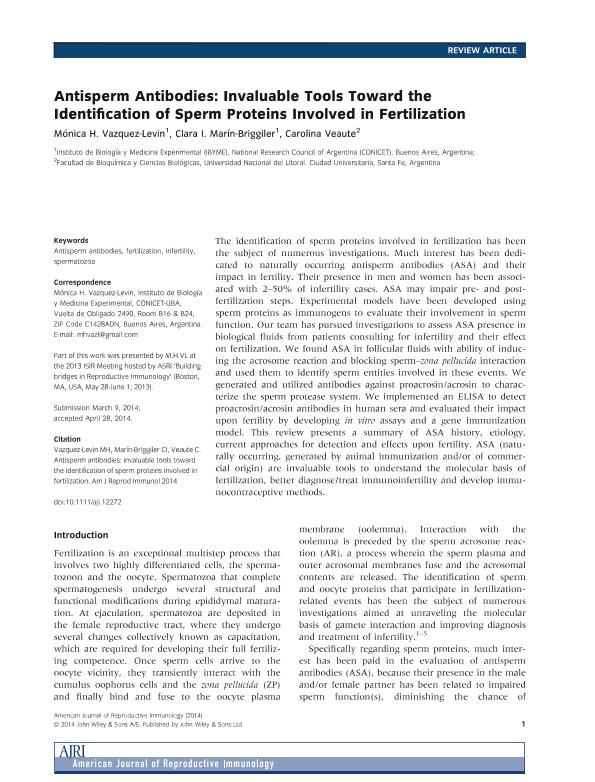Mostrar el registro sencillo del ítem
dc.contributor.author
Vazquez, Monica Hebe

dc.contributor.author
Marin Briggiler, Clara Isabel

dc.contributor.author
Veaute, Carolina
dc.date.available
2016-07-26T13:48:46Z
dc.date.issued
2014-08-30
dc.identifier.citation
Vazquez, Monica Hebe; Marin Briggiler, Clara Isabel; Veaute, Carolina; Antisperm antibodies: invaluable tools towards the identification of sperm proteins involved in fertilization; Wiley; American Journal of Reproductive Immunology; 72; 2; 30-8-2014; 206-218
dc.identifier.issn
1046-7408
dc.identifier.uri
http://hdl.handle.net/11336/6675
dc.description.abstract
The identification of sperm proteins involved in fertilization has been the subject of numerous investigations. Much interest has been dedicated to naturally occurring antisperm antibodies (ASA) and their impact in fertility. Their presence in men and women has been associated with 2-50% of infertility cases. ASA may impair pre- and post-fertilization steps. Experimental models have been developed using sperm proteins as immunogens to evaluate their involvement in sperm function. Our team has pursued investigations to assess ASA presence in biological fluids from patients consulting for infertility and their effect on fertilization. We found ASA in follicular fluids with ability of inducing the acrosome reaction and blocking sperm-zona pellucida interaction and used them to identify sperm entities involved in these events. We generated and utilized antibodies against proacrosin/acrosin to characterize the sperm protease system. We implemented an ELISA to detect proacrosin/acrosin antibodies in human sera and evaluated their impact upon fertility by developing in vitro assays and a gene immunization model. This review presents a summary of ASA history, etiology, current approaches for detection and effects upon fertility. ASA (naturally occurring, generated by animal immunization and/or of commercial origin) are invaluable tools to understand the molecular basis of fertilization, better diagnose/treat immunoinfertility and develop immunocontraceptive methods.
dc.format
application/pdf
dc.language.iso
eng
dc.publisher
Wiley

dc.rights
info:eu-repo/semantics/openAccess
dc.rights.uri
https://creativecommons.org/licenses/by-nc-sa/2.5/ar/
dc.subject
Sperm
dc.subject
Antibodies
dc.subject
Fertilization
dc.subject.classification
Biología Reproductiva

dc.subject.classification
Ciencias Biológicas

dc.subject.classification
CIENCIAS NATURALES Y EXACTAS

dc.subject.classification
Otras Medicina Básica

dc.subject.classification
Medicina Básica

dc.subject.classification
CIENCIAS MÉDICAS Y DE LA SALUD

dc.title
Antisperm antibodies: invaluable tools towards the identification of sperm proteins involved in fertilization
dc.type
info:eu-repo/semantics/article
dc.type
info:ar-repo/semantics/artículo
dc.type
info:eu-repo/semantics/publishedVersion
dc.date.updated
2016-06-15T19:08:52Z
dc.identifier.eissn
1600-0897
dc.journal.volume
72
dc.journal.number
2
dc.journal.pagination
206-218
dc.journal.pais
Estados Unidos

dc.journal.ciudad
New Jersey
dc.description.fil
Fil: Vazquez, Monica Hebe. Consejo Nacional de Investigaciones Científicas y Técnicas. Instituto de Biología y Medicina Experimental (i); Argentina
dc.description.fil
Fil: Marin Briggiler, Clara Isabel. Consejo Nacional de Investigaciones Científicas y Técnicas. Instituto de Biología y Medicina Experimental (i); Argentina
dc.description.fil
Fil: Veaute, Carolina. Universidad Nacional del Litoral. Facultad de Bioquímica y Ciencias Biológicas; Argentina
dc.journal.title
American Journal of Reproductive Immunology

dc.relation.alternativeid
info:eu-repo/semantics/altIdentifier/doi/http://dx.doi.org/ 10.1111/aji.12272
dc.relation.alternativeid
info:eu-repo/semantics/altIdentifier/doi/10.1111/aji.12272
dc.relation.alternativeid
info:eu-repo/semantics/altIdentifier/url/http://onlinelibrary.wiley.com/doi/10.1111/aji.12272/abstract
Archivos asociados
